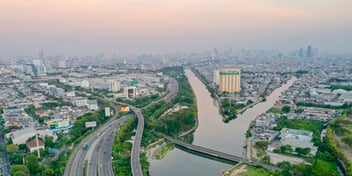How the water sector is improving parental leave

As water community businesses work towards more inclusive and diverse workplaces, flexible workplace arrangements for parents are becoming a key enabler for staff attraction, retention and satisfaction.
SUEZ Australia and New Zealand Head of Human Resources Bo Manamperi said flexible parental leave policies have become increasingly important for water companies seeking to garner the benefits of inclusive and diverse workplaces, as well as healthy pipelines.
“Supporting people is the hallmark of a good employer. Lots of things happen to us in life, but we believe life events shouldn't prevent our people from continuing their career with us,” he said.
"It is crucial for us to make sure all of our employees are supported in accessing different types of work flexibility, particularly for our employees that are taking the monumental step in becoming parents or growing their family.”
Melbourne Water Senior Employee Adviser Peita Sharp said a good parental leave policy — one that is both genuine and flexible — broadens the talent pool.
“Employees that want to have a family, or have caregiving duties, are looking for employers that are supportive of those responsibilities,” she said.
“It also reduces turnover, and increases engagement when employees feel supported before, during and after they take parental leave. But, importantly, it also shows that the company is committed to equity and diversity.
“Where traditionally extended leave was really only accessible by one parent — predominantly the female — parental leave flexibility allows for parents to balance their work and family responsibilities in ways that work for them.”
Making change
In mid 2021, Melbourne Water modified its parental leave policy to remove the differentiation between primary and secondary caregivers leave, Sharp said, a result of feedback from parents who were ineligible for leave under the prior policy.
“Melbourne Water’s parental leave policy used to differentiate between primary caregivers' leave and secondary caregivers' leave. This meant that after accessing two initial weeks of caregivers leave, a secondary caregiver would be entitled to 12 weeks leave if their partner returned to work on a full-time basis,” she said.
“We were receiving a lot of requests from working fathers who wanted to take the additional leave, but couldn't because their partners were only returning to work on a part-time basis.
“Any parent now has access to 14 weeks paid caregivers leave that they can take at any time following the birth of their child.”
Sharp said removing the differentiation between primary and secondary caregivers puts parents on an equal footing.
“It helps create greater equality between parents, who are enabled to share caregiver responsibilities. Both parents are now able to have bonding time, which traditionally fathers didn’t have,” she said.
“It also helps to normalise shared caregiving responsibilities, and I think helps some parents feel more comfortable about taking extra time off because they know the business supports them to do so.”
Aside from its new parental leave policy, Melbourne Water’s broader flexible workplace arrangements help employees continue to manage ongoing caregiving responsibilities, regardless of the age of their child or children.
“We’ve got a flexible work policy in place, which offers staff the opportunity to purchase an additional four weeks leave, which can be of great benefit to working parents,” Sharp said.
“This allows people to take time off without pay while removing the financial impact. We reduce the employees' pay by a small amount over the span of 12 months. People with school-aged children have found this very helpful, as it allows them to take more time off during school holidays if needed.”
Melbourne Water also partners with Grace Papers, a workplace gender equality company that provides coaching, workshops and resources for employees with families.
“Grace Papers provides a parental leave coaching platform, and courses for our employees, so they can access support before, during and after their parental leave,” she said.
“Coming back into the workplace after having a child isn’t easy. This portal is about ensuring there is support available for employees juggling families and work.”
Increasing financial support
SUEZ Australia has also been making changes to its parental leave policy, as well as amending superannuation offerings and parental payments, to help support new parents, particularly women.
“Our old policy was vastly outdated, and we knew something had to be done. We had some particularly unhealthy statistics around women within our business who would go on parental leave and not come back,” Manamperi said.
“First, we increased our primary parental leave to 14 weeks, but we also made sure that, for the first full 52 weeks of leave, superannuation was carried through. We did this to ensure that parents, particularly women, are not unnecessarily penalised for having a family.
“We also increased our secondary parental leave to four weeks. But those four weeks can be taken within a two-year period, allowing for parents to utilise that time off in ways that work best for them.
“Our new policy has been a major win for us, as we’ve managed to retain all our staff who have taken parental leave so far.”
Manamperi said SUEZ has plans to continue to increase the length of its paid parental leave policy and introduce more flexibility into caregiving arrangements, and that these initial changes are just the beginning.
“We have also introduced the provision of an extra two-week payment, 12 months after someone returns from parental leave. We want to help alleviate the financial burden many parents face, including the cost of childcare,” he said.
“Typically, we see new parents come back to work part time, and we want to make sure they know they have extra support when they are beginning to think about coming back to work.”
Small steps, big difference
While overhauling parental leave policy might seem like a mammoth task, Manamperi said it is important for water businesses to begin with small, manageable steps, which is all about committing to ongoing improvement for staff.
“If we're to be truly inclusive and to truly challenge the norm, then we've got to enable it. If we don't enable it, by walking the talk, things will never change,” he said.
“We need to live what we believe. And we believe in inclusivity, we want to be bringing on people from diverse backgrounds, backgrounds that reflect our customers and the communities we serve.”
Manamperi said taking this journey is also about nurturing the next generation of employees, and making SUEZ — and the water community more broadly — a place that people love to work.
“For us to enable the next generation, they need to see themselves in our workforce. When we, as an industry, go out and sell what we do, we need to show the next generation what's possible. We want young, talented people to picture themselves in our industry,” he said.
“Policies around parental leave and flexible work are the symbols of change. They’re the lines in the sand, they’re new standards that show a commitment to moving forward with nurturing the health and happiness of our staff.”


